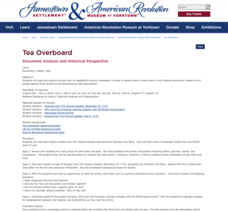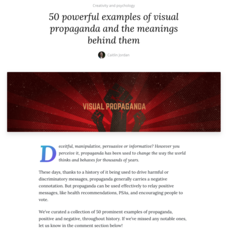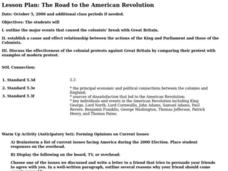Curated OER
Indian Removal: The Cherokees, Jackson, and the “Trail of Tears”
Students examine executive power. In this Indian Removal lesson, students listen to their instructor present a lecture regarding the "Trail of Tears". Students respond to discussion questions regarding the lecture.
Curated OER
Constitutional Resources
Students explore the Constitution, bill of rights, framers, Supreme court cases and educational games.
Curated OER
The Marshall Plan for Rebuilding Western Europe
Students examine the aftermath of World War II. In this Marshall Plan activity, students listen to their instructor present a lecture regarding the plan to rebuild Western Europe and its outcome. Students respond to discussion questions...
Curated OER
Social Darwinism and American Laissez-faire Capitalism
Students investigate Social Darwinism. In this government systems lesson, students listen to their instructor present a lecture on the details of Social Darwinism and American laissez-faire capitalism. Students respond to discussion...
Curated OER
Shays’ Rebellion: A Massachusetts Farmer’s Account
High schoolers analyze the effects of Shays' Rebellion. In this Shays' Rebellion instructional activity, students listen to their instructor present a lecture regarding the details of the rebellion and the events that led to it. High...
Curated OER
Exploring Arthurian Legend
High schoolers investigate the evolution of the King Arthur stories and analyze them as a window into the culture that preserved them. They trace the legends through their earliest versions through medieval and Victorian times and into...
University of California
Roots of the Cold War
When and how did the Cold War begin? To answer this question, you will not find a better-organized, in-depth, activity- and inquiry-based resource than this! Executing best teaching practices throughout, each portion of this inquiry...
Roy Rosenzweig Center for History and New Media
Patriots or Traitors - Point of View in the War for Independence
Patriots or traitors? Class members analyze images that present widely differing views of the Boston Tea Party, identifying the point of view of the image, the propaganda devices used, and the intended audience.
Smithsonian Institution
War of 1812
Luckily for those who aren't history buffs, anyone can guess that the War of 1812 happened in ... 1812. But how to cover the rest of the story? The resource does just that with effective direct instruction that includes statistics,...
Curated OER
World War II
Offering a comprehensive overview of the beginning of World War II, this resource could be a useful addition to a unit on this topic. It could be used as a way to lead a discussion on the war, or as a review tool before a test. Either...
North Carolina Consortium for Middle East Studies
Missing Pieces of the Puzzle: African Americans in Revolutionary Times
What's missing from most studies of the American Revolutionary War is information about the role African Americans played in the conflict. To correct this oversight, middle schoolers research groups like the Black Loyalists and Black...
Curated OER
Afghanistan: Country Report with Questions
Building fluency in reading informational text is part of the common core. Get learners reading information about past and current issues related to the country of Afghanistan. They read the seven paragraph passage, then answer four...
Curated OER
History Review: Colonial America
Explore key moments in American history with the click of a mouse! Learners read 50 questions from different eras in early America, and watch the rest of the presentation to find more questions to answer.
National Endowment for the Humanities
Lesson 1: The United States Confronts Great Britain, 1793–1796
After the Revolutionary War, the success of the United States was far from guaranteed. Foreign powers coveted the new land, and Great Britain challenged American sovereignty. Learners consider the challenges facing the new nation using...
Jamestown-Yorktown Foundation
Tea Overboard
While less well known than the event in Boston, the Yorktown Tea Party was equally decisive in turning community sentiment against Great Britain. To gain an understanding of why the colonists objected to the Tea Act, young historians...
National Endowment for the Humanities
Lost Hero: Was John Hanson Actually the First President?
The first president of the United States was ... John Hanson? Scholars investigate the notion that the initial leader of the nation was not George Washington. Using research, articles, and open discussion, individuals create a quest for...
National Endowment for the Humanities
Lesson 2: The United States, France, and the Problem of Neutrality, 1796–1801
While the French Revolution could be considered inspired by the American Revolution, it created thorny problems for the new United States. Should the United States get involved and be drawn into a European drama? Was the US strong...
Cornell University
The Physics of Bridges
Stability is key when building a bridge. Scholars explore the forces acting upon bridges through an analysis of Newton's Laws and Hooke's Law. The activity asks individuals to apply their learning by building a bridge of their own.
Canva
50 Powerful Examples of Visual Propaganda and the Meanings Behind Them
Propagandists have many tools at their disposal to influence thinking and behavior. Among the most powerful are the visual tools, posters designed to grab the attention and stir the emotions of viewers. Check out this collection of...
Facing History and Ourselves
Taking Ownership of the Law
The work of building and maintaining a democracy is, in the words of Justice William Hastie, "never finished." To better understand what Hastie sees as an ongoing building process, class members listen to a seven-minute podcast about two...
Curated OER
America: 1763-1776
In this online interactive history learning exercise, students respond to 10 short answer and essay questions about the United States between the years 1763 and 1776.
Curated OER
The Road to the American Revolution
Learners consider the case for forming a new, independent nation. In this American Revolution lesson, students examine the people, places, and events that led to the outbreak of war in the colonies. Learners compare colonial protests to...
Curated OER
Excerpt from Eyewitness Accounts of Slavery in the Danish West Indies"
Use the power of primary sources to help young historians understand the conditions Africans endured while being shipped during the slave trade. After reading an excerpt from Eyewitness Accounts of Slavery in the Danish West Indies,...
National Endowment for the Humanities
Common Sense: The Rhetoric of Popular Democracy
Students identify important arguments for independence made in Thomas Paine's Common Sense. They explain why these arguments helped persuade American colonists that independence was necessary. Students describe the importance of Common...

























